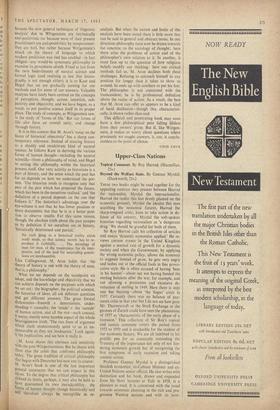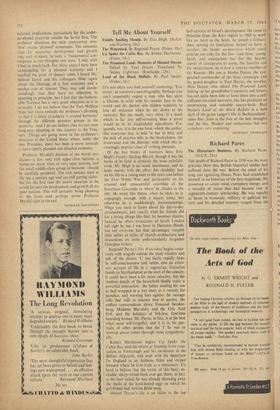Upper-Class Nations
Topical Comment. By Roy Harrod. (Macmillan,
Beyond the Welfare State. By Gunnar Myrdal. (Duckworth, 21s.)
THESE two books might be read together for the appealing contrast they present between Harrod the nationalist, Myrdal the internationalist, Harrod the realist (his feet firmly planted on the economic ground), Myrdal the idealist (his eyes searching the economic future), Harrod the sharp-tongued critic, keen to take action in de- fence of his country, Myrdal the soft-spoken historian regarding nationalism as 'a dangerous drug.' We should be grateful for both of them.
Sir Roy Harrod calls his collection of articles and essays 'dynamic economics applied.' He re- views current events in the United Kingdom against a normal rate of growth for a dynamic society and when the Government, by applying the wrong economic policy, allows the economy to stagnate instead of grow, he gets very angry and lashes out at the official fools in fine provo- cative style. He is often accused of having 'bees in his bonnet'—about our not having funded the sterling balances after the war, for example, and our allowing a premature and excessive de- valuation of sterling in 1949. Here there is only one bee buzzing—about 'the bogus' crisis in 1957. Certainly there was no balance of pay- ments crisis in that year but I do not see how poor Mr. Thorneycroft or the Stock Exchange or the gnomes of Zurich could have seen the phenomena of 1957 as 'characteristic of the early phase of a recession.' This collection of Sir Roy's topical and caustic comment covers the period from 1953 to 1959 and is invaluable for the student of our economic history. We are all indebted to his prolific pen for so constantly reminding the Treasury of the importance not only of not hin- dering economic growth but of recognising the first symptoms of early recession and taking counter-action.
Professor Gunnar Myrdal is a distinguished Swedish economist, ex-Cabinet Minister and ex- United Nations senior official. He also writes with distinction and his book, drawn and expanded from his Storr lectures at Yale in 1.958, is a
pleasure to read. It is concerned with the trend towards economic planning in the rich and pro- gressive Western nations and with its inter-
national implications, particularly for the under- developed countries outside the Soviet bloc. The professor dismisses the stale controversy over 'free' versus 'planned' economies. The common urge for economic development and growth may well produce, he says, a 'fundamental con- vergence in our thoughts and aims.' 1 only wish I had as much faith. For thirty years I have been campaigning for a planned economy and I reached the point of despair when I heard Mr. Selwyn Lloyd and his colleagues bleat again about the blessings of a free economy and a market rate of interest. They may add conde- scendingly that they have no objection to planning in principle, but I feel that the fashion- able Toryism has a very great objection to it in principle. I do not believe that the Tory Welfare State will move towards the professor's planning or that it is likely to achieve 'a created harmony' through the different pressure groups in the economy. And I do not believe that we can trust long-term planning in this country to the Trea- sury. Things are going more in the professor's direction in the United States where, under the new President, there has been a move towards a more tightly planned and directed economy.
Professor Myrdal's division of the world into classes—a few very rich upper-class nations, a numerous lower class of very poor nations, and the small middle-class group in between—should be carefully pondered. The rich nations were at the top a century ago and are still getting richer, but for the first time the power situation in the world favours the development and growth of the poor nations. This will certainly bring planning to the front—and perhaps prove Professor M yrdal right in the end.
Is 1101.AS DAV ENPOR







































 Previous page
Previous page